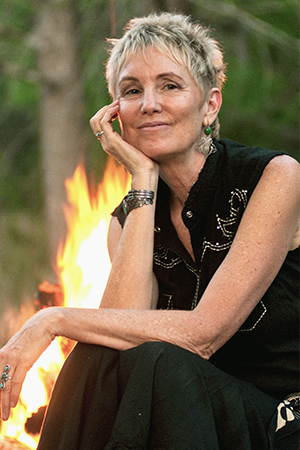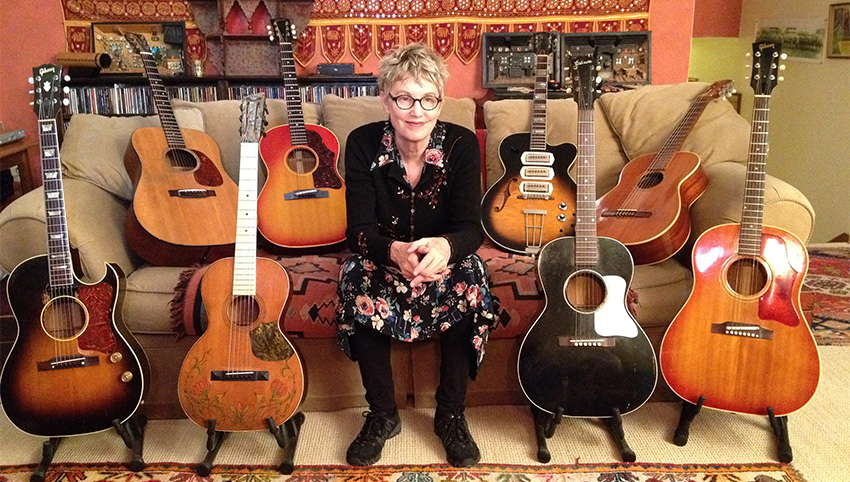Eliza Gilkyson
room full of stories, house full of guitars

“I was touring with Andreas Vollenweider, and we were in Florida. We were playing at Miami Convention Center, or something. Some big hall. I got a note from somebody in the audience that said, “I have a present for you. Can I come see you?”
I got him backstage, and he had his guitar. He said, “Do you recognize it?” He opened up the case and I said, “No. I don’t recognize it.” It had gotten so old, I didn’t even know it was my guitar. He gave it back to me. It was so, so great. I’ve recorded it now. I love that guitar. It reminds me of that day with my Dad, too.”
artist details
Website: elizagilkyson.com
Favorite Guitar:
Heroes: Bruce Langhorn
Tour: Watch Her
Workshops: elizagilkyson.com
we had the privilege to speak with eliza…
AL On her first guitar
EG “We went down to Mexico. I went with my guitar teacher who was Van Dyke Parks, whose older brother Carson, they were both in my dad’s band, The Easy Riders. In Tijuana, you could walk into a guitar shop, and they’d have these Mexican made guitars hanging off the ceiling. Carson was so good at picking them out. He would just walk along, and he picked out ten great guitars. He gave my sister and me, we got the pick of the whole group. That was my first guitar, and it was a very nice guitar. It was a wonderful sounding guitar. I have no idea where it ended up because I did move on from that shortly thereafter.”
AL On her heroes
EG “This guy Bruce Langhorn who’s played on a lot of the early Dylan stuff. He’s a real folk guitarist. I love the Richard Thompson’s band: The Fairport Convention. I loved Joan Baez. Of course, there was Joni Mitchell who was experimenting with tunings, and that got us all into experimenting with tunings. Any of the early folk rockers, Stephen Stills, great example of a killer acoustic guitar player in the rock music world, when I was coming up. And Jackson Brown. People that were playing acoustic music. They wrote their songs. You could tell they were sitting around somewhere in a hotel and they were strumming their acoustic guitar. I think those were early influences for me.”
AL On playing tribute songs
EG “I want to inhabit them, because when I sing I have to connect with my words in a certain way. I have to connect with it in a way that makes it meaningful to me. I do really have to pick songs that are inhabitable to me, so I can sing them. Something about being alone with your instrument, and the wood is vibrating in the air, and the sound hole. It’s almost like the instrument is playing you. You’re getting the instrument to respond and then the instrument is getting you to respond to it. There’s a relationship that we have with an acoustic instrument. It has everything to with wood, and air moving, and vibration.”
AL On choosing an instrument
EG “I urge people to get a decent instrument because when they’re starting out … If you’re going to play an instrument that doesn’t vibrate, or it’s clumsy to play and it doesn’t have good intonation, because intonation is also really important … Being in tune, also, because that’s how we get tuned. We resonate with something that’s in tune. It does make a difference. I always urge people, get a decent instrument. You don’t have to pay a lot of money, but you need an instrument that will play you as much as you’ll play it.”

AL on the creative process
EG “Trick yourself into writing. One of the ways to do that is to just sit down with your instrument and just play around. No real direction in mind. No goal in mind other than to just feel your way around the instrument because the instrument will teach you. If you’re just playing around with that then you’ll figure out another chord progression, or you’ll come up with a little hook line that you’ve never had before. Songs are built around those things. I always start with the music first.
I keep a guitar in every room in the house. I have one in the living room, I have one in my office, I have one in my bedroom, and I leave them out ready to be picked up at any time because sometimes just having to go down two flights of stairs to my office is enough to keep me from picking up a guitar. I urge people, have those around. Leave them out. Leave them hanging on a wall. If you see it you’ll pick it up. If you have it in a case, you’ll walk past it.”
AL On her favorite instruments and her go-to guitar
EG “I have my Goya that my dad gave me in the living room. I keep him really kind of tuned and ready to go. Upstairs I have a Gibson B-25 that’s a student model guitar that is just a gorgeous warm little sounding Gibson with a very nice neck. I love it. Normally in my office, I would have my Gibson 1932 L-00. That’s the one I keep in my office. That’s my main recording guitar. An old 1930’s Regal with silk and steel strings on that. It’s very woody sounding. Very parlor guitar sounding. Very unique sound. The song, “Roses at the End of Time,” you can hear that guitar on that song. I have a love relationship with three or four of them. Every time I play them I just go, “Oh god. I just, I love this guitar.”
AL On her next project
EG “I’ve already started my next record working on secular hymns, which is just exactly what it sounds like. Spiritual music for non-religious people. It’s going to be an exploration of my own quest for finding meaning without having to fall into a kind of a belief system, and a religious belief system. It’ll have a sort of meaningful, communal, mysterious journey.”
AL On the music she listens to
EG “Eydie Gorme with, “La Pancho.” Then the beautiful woman, Cesária Évora. I listen to a lot of Hawaiian music. That’s one of my favorite acoustic music. I listen to that a lot. I have several slack key masters, recordings that have a lot of the greats on there.”
AL If you you could see one acoustic show this year, only one, who would it be?
EG “I would probably want to hear one of those Vera Cruz harpists. A Vera Cruz style harpist that plays … Sometimes you’ll see them with a really Mexican music band. I think probably the thing that I enjoy the most is a very good old school Mexican music. Nothing makes me happier. Hearing that Vera Cruz style harp with the horns, the requinto, the guitarron, the tiple, all those instruments together playing those romantic old ballads, I think I’d die and go to heaven.
For the past two years, Eliza has been running a songwriting workshop together with John Gorka. She shared with us her goals for the workshop.
What I’m focusing on is moving (a) song from one place to another. Making the song the best that it can be. I don’t really care if you’re a beginner songwriter or an advanced songwriter, I like to just work with wherever somebody’s at and find out how they can make it even better. That’s really what I do. If somebody starts out at zero, then we start with an idea and we start from there. How to turn that into a song. If somebody’s coming in with a fully developed idea then I’m going to say, “Here’s where you’re losing me,” or, “Here’s where it’s feeling a little stuck,” or “Here’s where we need to edit,” or “That’s great! Don’t need to do a thing to it.”
